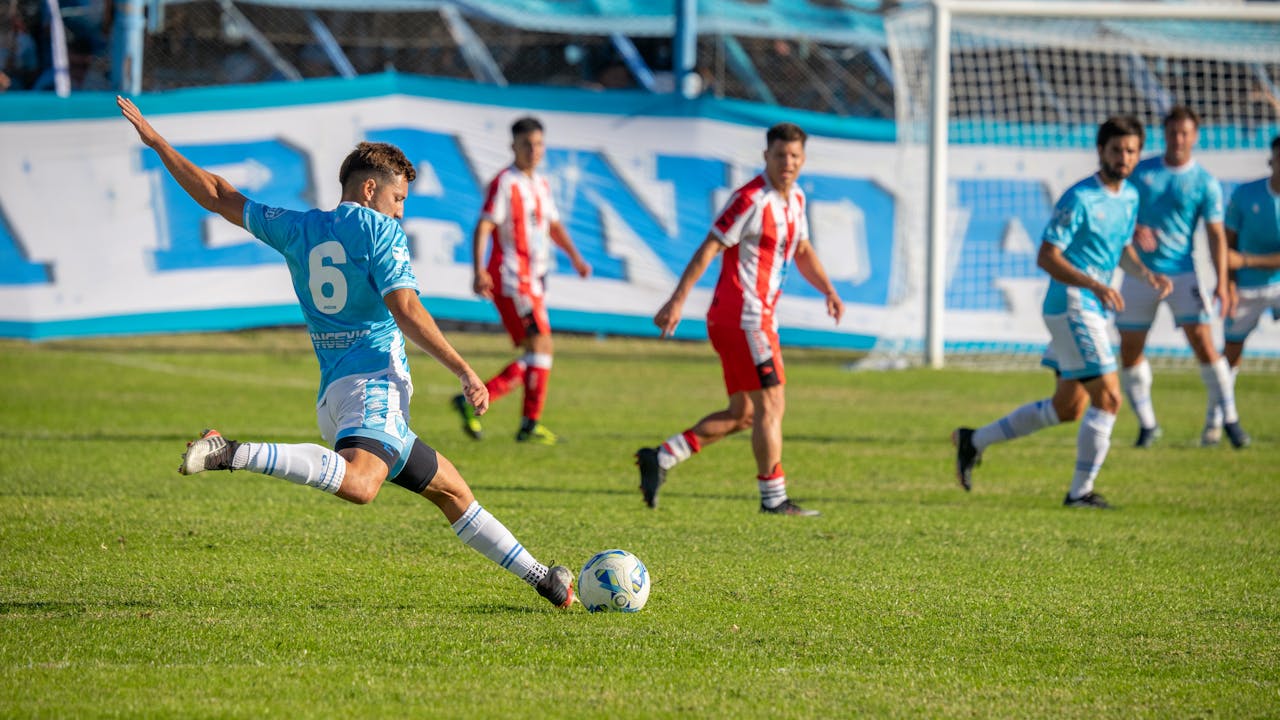Soccer players retire early because it is a challenging sport to play. Male soccer players usually retire when they’re in the 34-36 age bracket, while female soccer players retire earlier. They retire when they’re between 32 and 34. The average career span of a professional player is about 8 to 10 years, not accounting for their training, minor, amateur and pro stages. So, in total, the length of their career is about 16 to 20 years.
If you think of Cristiano Ronaldo and Lionel Messi, two professionals who have played their best in their mid-30s, then we know that retirement age depends on a lot of factors. They play with all they’ve got and deliver top-notch performances even at that age.
So, even though soccer is challenging and requires a lot of physical and mental fitness and skill, retirement age depends on a number of factors even though they may be playing their best at this age. Retirement is inevitable and can happen at any point in a soccer player’s career.
Retirement Age in Soccer

The careers of soccer players often last from their late teens to their mid- to late-30s, depending upon their level of achievement, injury history, and fitness. An average professional soccer player’s career lasts eight to ten years.
Soccer players often retire between the ages of 34 and 36, while others choose to retire earlier in life owing to personal circumstances, poor form, or injuries that occur in their early 30s or even late 20s.
Nonetheless, based on their unique situation, some players might retire sooner or later. Some of the best soccer players in history have also prematurely retired from the game.
Compared to their male counterparts, female soccer players typically retire early. Female soccer players frequently retire between the ages of 32 and 34. Even before then, many of the best female soccer players had already retired.
Pregnancy, injuries, less compensation, and a lack of support for female soccer players are some of the causes of this. Compared to their male colleagues, even the highest-paid female soccer players make significantly less money.
Also Read: Top 10 Fastest Soccer Players in 2024
What about the retirement age in top football-playing nations?
Soccer, or football, as it’s known in most countries, is an extremely popular sport. In America, players tend to retire late as it’s not one of the more popular sports in the country and players are fewer here. But, in other nations like Brazil and Argentina, where it is more popular and widely played, players tend to retire later in their careers. The average retirement age here is around 37-38.
In contrast, players from England and Germany tend to retire earlier, with the average retirement age being 33-34 years.
Why do players choose to retire?

As we’ve mentioned earlier, the average career span of a professional player is around 8 to 10 years. But there are several players who choose to retire earlier than their time. Let’s check out some of the reasons behind why soccer players choose to retire:
Injuries
Most players get injured on the job as it is a tough and challenging game to play. This is why injuries are one of the most common reasons why soccer players retire. Those who sustain severe injuries may not be able to play as before and thus might have to opt for early retirement even.
Burnout
Since this is a challenging sport that requires a lot of mental toughness, the constant pressure and demands of being a professional player can lead to burnout. This is also a common reason why players retire, so they can focus on their mental wellbeing and physical health.
Personal reasons
Players may want to retire for their own personal reasons like focussing on their family or seek other job opportunities that aren’t as demanding as this one. Many do not have time to focus on their personal life as this is a demanding sport, so they may choose to retire to focus on their own lives outside of the field.
Financial reasons
Playing soccer is not as glamorous as the ads and marketing make it seem to be. Many don’t get paid what they actually deserve, especially female soccer players. So, due to financial constraints, many may choose to retire to get jobs that have more stable income sources.
Also Read: Top 12 Best Trios In Football History
Performance issues
After a while, due to burnout and injuries, players may see a decline in their performance. As they age, too, their performance may not be what it was when they were in their prime. This can lead to a loss of confidence and a decrease in playing time, which eventually affects their financials and mental stamina even.
Lack of playing time
It is frustrating when you’re sitting on the bench a lot, so players may choose to retire to escape this. They can find other job opportunities where they are engaged and enthusiastic about their workday.
Other work opportunities
A lot of soccer players who have been lauded for their good looks often retire early to pursue a career in modeling or acting. Some even do it side by side with their soccer careers, but many opt for one or the other so they can focus on it full time and build a career there.
Why do some soccer players retire early?

As we’ve mentioned before, soccer is a tough sport to play and maintain professionally. The worry of injury, burnout and other reasons can make a professional soccer player want to retire early, instead of in the 32-34 or 34-36 age groups.
Speaking of injuries, soccer has seen some of the most nasty tacklings, leading to injuries so bad that the players have had to retire early on medical grounds. Other reasons for early retirement include:
Poor form
It is important to maintain good form so one can perform well on the field. Some players lack this and hence have poor form, leading to criticism from the fans and disappointment. This may be one of the reasons why soccer players choose to retire early – so they can avoid the mental toll of having poor form on the soccer field.
Chronic injuries
To prevent the risk of further injury, some players with chronic injuries may opt to retire early. This protects their physical wellbeing and they can focus on finding careers that aren’t as physically demanding as soccer.
Personal reasons
Most soccer players start out early – in their teens or early 20s. So, players may choose to retire early to focus on their education, their family, other career prospects, etc. This gives them a chance to live in a holistic environment rather than going through the trials and tribulations of being a professional soccer player.
Also Read: 10 Reasons Why Cristiano Ronaldo is Better Than Messi
Popular professions among retired players
If you kept up with the 2023 FIFA World Cup in Qatar, you would’ve noticed that many successful retired soccer players returned to the field as commentators. This keeps them in touch with their passion while also not having to physically exert themselves on the field. Moreover, they get to share their experiences and learnings from their time as players, offering valuable insights to the fans. Other professions that are popular among retired soccer players are:
Coaching
Several former players become coaches or managers of soccer teams after retiring from playing themselves. They use their own experiences and knowledge to train new talent. This puts them in a unique position as they have experience as a player and now as a coach, allowing a holistic view of the game.
Media
Like we mentioned before, many retired players tend to take to forms of media like radio, tv, etc as commentators, analysts, or pundits to share their insights into the game and predict what might happen next. As they have insider knowledge on the game, their comments and opinions will be useful to those seeking to know more about the game and for those looking to improve their performance.
Business
A good way to leverage your fame and network is to start a business. And this is exactly what some retired soccer players do. They either start their own companies or invest in existing ones to further their careers.
Education
Many players go on to do their higher education once they’ve retired. There are many successful retired players who have gotten degrees or postgraduate degrees to prepare themselves for the time after their retirement. This allows them to pursue a larger demographic of work so they are financially stable in the coming years.
Also Read: How Many Players Are on the Field During a Soccer Game?
Frequently Asked Questions
1. At what age will Messi retire?
Although the Argentinian player has not given any indication as to when he will retire, the typical age for a football player to retire in Argentina is 36-38.
2. What is the maximum age to play football?
There is no age bar for this game. All you have to make sure is that your physical condition is good because this is a very challenging and demanding sport.
3. Can a 40 year old play football?
Certainly! There are several players out there who have played in the field past their retirement ages. It all depends on your physical and mental wellbeing, performance, and success.
Also Read: Top 10 Hottest Footballers In The World 2024
Conclusion
A male soccer player’s average retirement age is 34-36 while that of a female soccer player is 32-34. Although it varies from country to country, the retirement age of most soccer players is mid-30s. There are several reasons why some players may choose to retire early as well, since this is a physically and mentally demanding sport. Most players start out really young as well, so the toll it takes on their bodies is intense. Even then, many players return to the field as coaches, managers, commentators, etc, post retirement.

